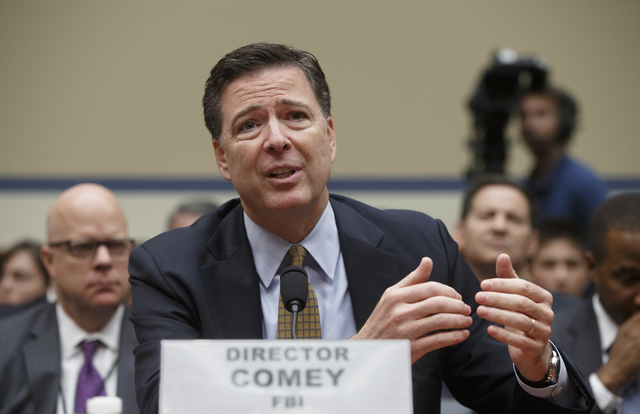WASHINGTON — Under an onslaught of Republican criticism, FBI Director James Comey vigorously defended the government’s decision not to prosecute Hillary Clinton over her private email setup, rejecting angry accusations that the Democratic presidential candidate was given special treatment. ADVERTISING
WASHINGTON — Under an onslaught of Republican criticism, FBI Director James Comey vigorously defended the government’s decision not to prosecute Hillary Clinton over her private email setup, rejecting angry accusations that the Democratic presidential candidate was given special treatment.
To criminally charge Clinton based on the facts his agency’s yearlong probe had found would have been unwarranted and mere “celebrity hunting,” Comey told a congressional investigative committee Thursday.
In nearly five hours of testimony, he sought to explain the Justice Department’s decision ending an investigation that has dogged Clinton’s presidential campaign and raised fresh questions among voters about her trustworthiness.
Republicans’ hard, skeptical questioning made it clear that settling the legal issue will not end the matter as a political issue as Clinton campaigns against Republican Donald Trump, who scornfully refers to her as “Crooked Hillary.”
Republicans on the panel, voices sometimes raised in apparent frustration and irritation, said they were mystified by the decision not to prosecute because they felt that Comey, in a remarkably detailed and critical public statement on Tuesday, had laid out a sufficient basis for charges.
“I totally get people’s questions,” he said, but the FBI was obliged to follow the law.
Comey said investigators found no evidence that Clinton or her aides intended to break the law, even though they mishandled classified information. A misdemeanor statute requires the mishandling to be intentional, Comey said. A law that permits felony prosecution due to gross negligence has been used only once in the 99 years since it was enacted — and that was in a case involving espionage.
“We don’t want to put people in jail unless we prove that they knew they were doing something they shouldn’t do,” Comey said. “That is the characteristic of all the prosecutions involving mishandling of classified information.”
Later Thursday, State Department spokesman John Kirby said the department was reopening its internal investigation of possible mishandling of classified information by Clinton and top aides. The internal review was suspended in April to avoid interfering with the FBI inquiry, Kirby said. Earlier this week he said former officials could face loss of security clearances or other administrative sanctions.
Comey’s appearance before the House Oversight and Government Reform Committee marked his first public statements since his announcement that removed the threat of criminal charges against Clinton but also revived public scrutiny of her email behavior as secretary of state in President Barack Obama’s first term.
Committee chairman Jason Chaffetz, R-Utah, told Comey that the FBI’s decision showed a “double standard” for powerful people. Had the “average Joe” done what she had done, he said, that person would go to prison.



